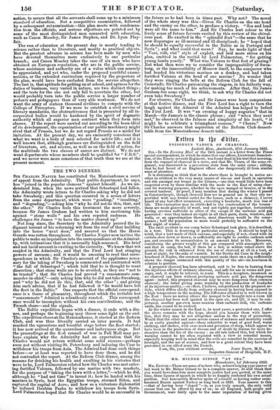fetters to the titan. POISONOUS VAPOUR OF CHARCOAL.
Iesketh How, Ambleside, 27th January 1855. Sue—In the Evening Mail of the 24th instant is a letter from the Timer special correspondent, in which he states that one officer, Lieutenant Ramsbot- tom, of the Ninety-seventh Regiment, was found dead in his tent that morning, from the vapours of charcoal in a stove, and that Mr. Vicars, of the same re- giment, was discovered in a precarious state from the same cause ; adding, that be had heard of an Engineer officer also dangerously ill from similar want of attention.
It is distressing so think that in the above there is brought to notice an- other in addition to the very many causes of disease and death in operation and rife amongst our troops in the Crimea,—one that would little have been suspected even by those familiar with the mode in the East of using char- coal for warming purposes, whether in the open maugal or brazier, or in the covered tandour. In proof, I may mention that during the winter I passed in Constantinople, though charcoal fires are in general use in that city un- provided with any formal outlet for the fumes, such as a chimney, I never heard of any bad effect occasioned, exceeding a headache, much less loss of life. This exemption may be attribited to the construction of the houses these are made generally of wood, and not tightly put together, fortunately having crevices sufficient to allow of the escape of the carbonic acid gas generated : were they indeed air-tight in all their parts, doors, windows, and walls, or an approximation thereto, most disastrous would be the conse- quence ; half the population or more would probably be suffocated on the first night of winter. The fatal accident in our camp before Sebastopol took place, it is described, in a tent. This is deserving of particular attention. It should be kept in mind, that a tent made of thick canvass, and especially if wet, closed with its curtain-door down or drawn, is sufficiently air-tight to confine carbonic acid gas, and occasion its accumulation to an amount fatal to life. Moreover, considering the greater weight of this gas compared with atmospheric air, and that in camp, the bed, if there be a bed, is seldom raised above the ground, the risk is enhanced from the use of charcoal at all in a tent, at least at night, for the sake of warmth. In the Grotto del Cane in the neigh- bourhood of Naples, the common experiment made there on a dog sufficiently shows the danger connected with this quality of the air—its heaviness in relation to position. A prepared charcoal has been advertised, said to be free in burning from the injurious effects of ordinary charcoal, and safe for use in rooms and pas sages, and, it might be inferred, in tents. This is a deception, inasmuch as no charcoal can burn without producing carbonic acid gas, the dangerous agent : indeed, this prepared charcoal may be more dangerous than common charcoal ; the latter giving some warning by the production of headache of its injurious quality,—an effect, I believe, not produced by the prepared ar- ticle, which differs chiefly from ordinary charcoal in having been exposed to a high temperature in the making. The difference alluded to is well known in the East : there no nation allows the mangal to be brought into a room till the charcoal has been well ignited in the open air, and till, it may be con- jectured, another gas even more noxious than carbonic &cid, viz. carbonic oxide, has ceased to be evolved. As the winter season in the East is, in most years, a protracted one, I offer the above remarks with the hope, should you honour them with inser- tion, that they may be not altogether useless in the way of precaution. Would that the other and more severe causes of sickness and mortality could be as easily guarded against—those referrible to want of good food, warm clothing, and shelter, with over-work and privation of sleep, which appear to have been in the production of disease and of death by disease far more de- structive than the fire of the enemy : an old tale indeed this, but which for warning cannot be too often repeated with a view to remedial means, especially keeping well in mind that the evils are remedial by the exercise of foresight, and the use of science, and how to a great extent they have been prevented in our allied army the French.
Inspector-General of Hospitals, H.F.


































 Previous page
Previous page